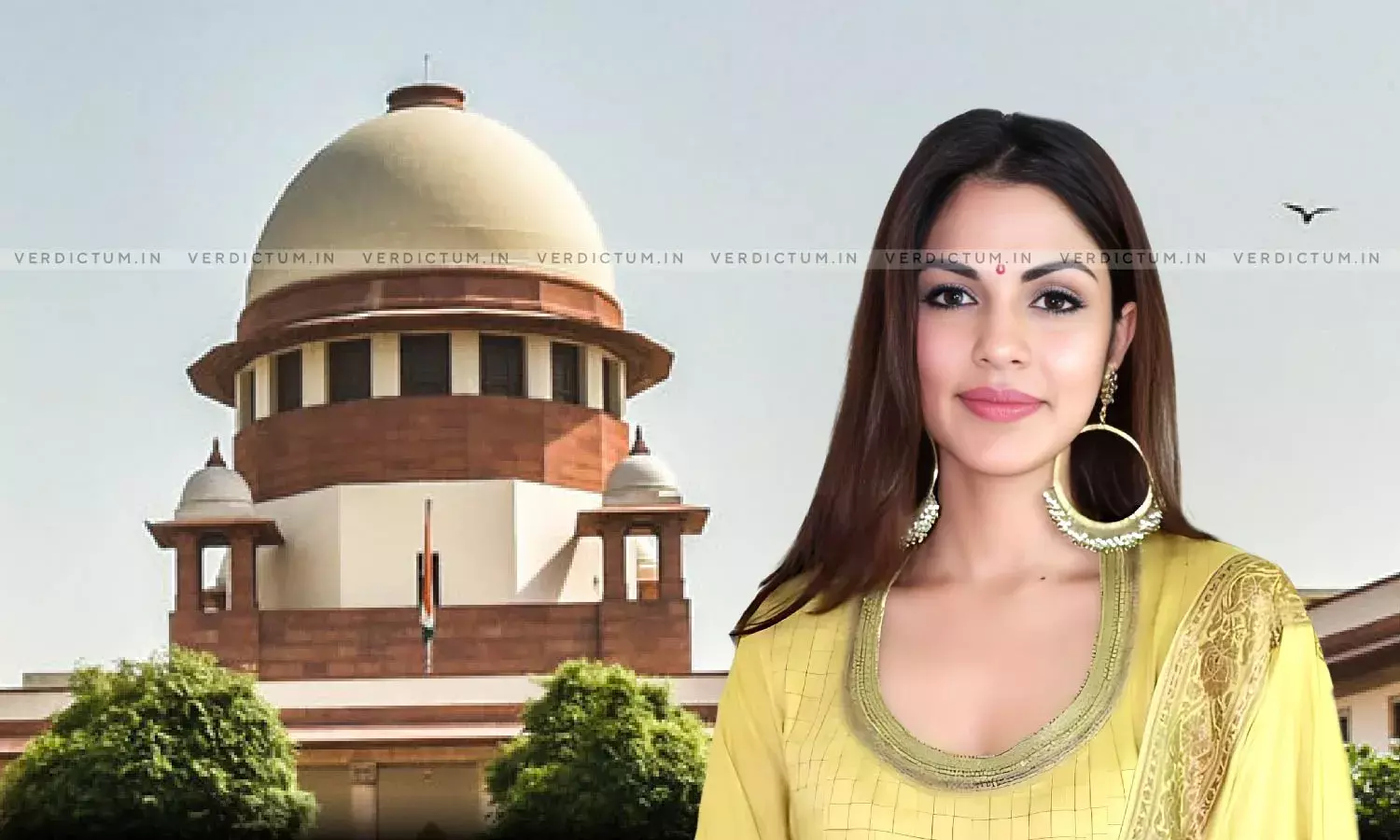Bombay HC’s Interpretation Of Sections 27A & 37 NDPS Act In Rhea Chakraborty’s Case Not To Be Treated As Precedent: Supreme Court

The Supreme Court today while taking note of the Centre's submission that it does not challenge the bail granted to actress Rhea Chakraborty in the case under the Narcotic Drugs and Psychotropic Substances Act, 1985 (NDPS) by the Bombay High Court, has left the interpretation of the interplay between Sections 27A and 37 of the NDPS Act open, upon the Central Government’s request. As per the order passed by the Apex Court, the said judgment of the High Court shall not be treated as a precedent for any other matter.
The Narcotics Control Bureau (NCB), Mumbai had arrested Rhea on September 8, 2020. However, the Bombay High Court through its judgment dated October 7, 2020 had granted bail to her. The Court was of the opinion that giving money to another for consuming drug does not mean encouraging such habit and would not mean 'financing' or 'harbouring' as envisaged under Section 27A of the Act.
A bench of Justice A.S. Bopanna and M.M. Sundresh, pursuant to the request of the Union, observed, “Having heard the learned ASG, at this stage the challenge to the impugned order in grant of bail may not require. However, the question of law raised is left upon to be considered in an appropriate case and as such the judgment of the High Court shall not be treated as a precedent in any other case”.
ASG S.V. Raju appearing for the Union of India at the outset submitted, “We are not challenging the bail order it is only the interpretation of those two sections”.
“Milords may, if it is observed that the question of law can be kept open and not prejudice (not clear) as a precedent”, he further added.
In the present matter, Chakraborty sought bail for the offences punishable under Sections 8(c) read with 20(b)(ii), 22, 27A, 28, 29 and 30 of the Narcotics Drugs and Psychotropic Substances Act, 1985.
It was submitted by the NCB that Showik Chakraborty (another accused) used to facilitate the delivery of drugs through Abdel Basit Parihar from Kaizan Ebrahim and Zaid (other accused), drugs were received by Sushant Singh Rajput’s aids and the payments were in conscious knowledge of Chakraborty and him. It was also alleged that Dipesh Sawant as per his statements used to receive drugs along with Samuel Miranda for consumption by Sushant Singh Rajput.
Therefore, the questions before the Court to be considered were:
I. Whether the offences alleged against the Applicant are bailable.
II. If the offences are non-bailable, then, as to whether rigours mentioned in Section 37(1)(b) of NDPS Act are applicable.
III. If such rigours are not applicable and if the offences are non-bailable then, whether the Court should exercise its discretion to grant or refuse bail.
It is pertinent to note that Section 37 provides for the special bail provisions for cognizable offences under the NDPS Act while Section 27A enumerates the punishment for financing illicit traffic and harbouring offenders. For “habouring”, the Act provides for rigorous imprisonment for a term which shall not be less than ten years but which may extend to twenty years and shall also be liable to fine which shall not be less than one lakh rupees but which may extend to two lakh rupee.
A bench of Justice S.V. Kotwal of the Bombay High Court had held, “I am unable to agree with the submission that giving money to another for consuming drug would mean encouraging such habit and would mean "financing" or "harbouring" as envisaged under Section 27A of the NDPS Act…The allegations and material against the present Applicant are that on some occasions she had used her own money in procuring drugs. She facilitated procuring of drugs through her brother. For that purpose employees of Sushant Singh Rajput were also used. As discussed earlier, her acts would not fall under Section 27A of the NDPS Act".
“The material at the highest shows that she has committed an offence involving contraband, but, the crucial element of incurring rigours of Section 37 in respect of commercial quantity is missing. Therefore, I am satisfied that there are reasonable grounds for believing that the Applicant is not guilty of any offence punishable under Sections 19, 24 or 27A or any other offence involving commercial quantity. There are no other criminal antecedents against her. She is not part of the chain of drug dealers. She has not forwarded the drugs allegedly procured by her to somebody else to earn monetary or other benefits. Since she has no criminal antecedents, there are reasonable grounds for believing that she is not likely to commit any offence while on bail”, the High Court had further held.
Cause Title: Union of India v. Rhea Chakraborty And Anr.

